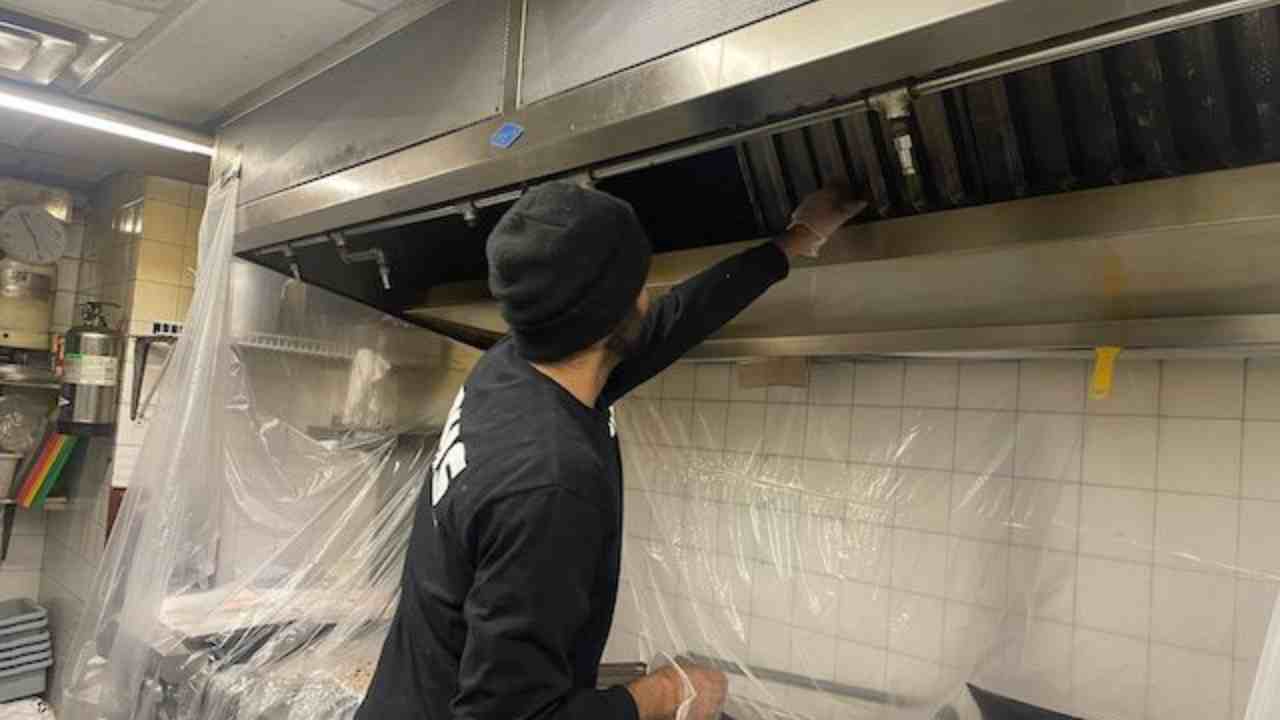Kitchen Exhaust Cleaning Fire Prevention

When it comes to fire prevention in commercial kitchens, one crucial aspect that often gets overlooked is kitchen exhaust cleaning. The buildup of grease and other flammable substances in the exhaust system can pose a significant fire hazard if not properly maintained. In this article, we will explore the importance of kitchen exhaust cleaning in fire prevention, the potential risks associated with neglecting this task, and the best practices for maintaining a clean and safe kitchen exhaust system.
Ontario-wide Kitchen Exhaust and Hood Cleaning – Best prices and service guaranteed.
The Importance of Kitchen Exhaust Cleaning
A kitchen exhaust system plays a vital role in removing smoke, heat, and odors from the cooking area. It consists of a range hood, ductwork, and an exhaust fan. Over time, grease and other particles accumulate in the system, creating a thick layer of flammable material. This buildup not only reduces the efficiency of the exhaust system but also increases the risk of a fire breakout.
Regular kitchen exhaust cleaning is essential for several reasons:
- Fire Prevention: The primary reason for cleaning kitchen exhaust systems is to prevent fires. Grease buildup in the ductwork and exhaust fan can ignite easily, leading to a potentially catastrophic fire. By keeping the system clean, the risk of fire is significantly reduced.
- Improved Air Quality: A clean kitchen exhaust system ensures that smoke, odors, and other pollutants are effectively removed from the cooking area. This helps maintain a healthier and more comfortable environment for kitchen staff and customers.
- Energy Efficiency: A clean exhaust system operates more efficiently, allowing the exhaust fan to function optimally. This can result in energy savings and lower utility bills.
- Compliance with Regulations: Many jurisdictions have specific regulations and codes regarding kitchen exhaust cleaning. Regular maintenance and cleaning are necessary to comply with these requirements and avoid penalties.
Ontario-wide Kitchen Exhaust and Hood Cleaning – Best prices and service guaranteed.
The Risks of Neglecting Kitchen Exhaust Cleaning
Failure to properly clean and maintain a kitchen exhaust system can have severe consequences. Here are some of the risks associated with neglecting this crucial task:
- Fire Hazard: The accumulation of grease in the exhaust system is a significant fire hazard. Grease fires can spread rapidly and cause extensive damage to the kitchen and surrounding areas. In worst-case scenarios, they can even lead to injuries or loss of life.
- Poor Air Quality: A dirty exhaust system fails to effectively remove smoke, odors, and other pollutants from the kitchen. This can result in poor air quality, leading to discomfort for kitchen staff and potential health issues.
- Reduced Efficiency: A clogged and dirty exhaust system hampers the airflow, reducing the efficiency of the exhaust fan. This can lead to increased energy consumption and higher utility bills.
- Non-Compliance: Neglecting kitchen exhaust cleaning can result in non-compliance with local regulations and codes. This can lead to fines, penalties, and even closure of the establishment until the necessary cleaning and maintenance are completed.
Ontario-wide Kitchen Exhaust and Hood Cleaning – Best prices and service guaranteed.
Best Practices for Kitchen Exhaust Cleaning
Now that we understand the importance of kitchen exhaust cleaning, let’s explore some best practices to ensure a clean and safe kitchen environment:
1. Regular Cleaning Schedule
Establish a regular cleaning schedule for the kitchen exhaust system. The frequency of cleaning depends on the volume of cooking and the type of food being prepared. High-volume kitchens may require monthly or quarterly cleanings, while low-volume kitchens may only need cleaning every six months to a year.
2. Hire Professional Cleaning Services
Consider hiring professional kitchen exhaust cleaning services to ensure a thorough and effective cleaning. Professionals have the necessary expertise, equipment, and knowledge to clean the entire system, including hard-to-reach areas. They can also provide documentation of the cleaning process, which may be required for compliance purposes.
Ontario-wide Kitchen Exhaust and Hood Cleaning – Best prices and service guaranteed.
3. Clean the Range Hood and Filters
Regularly clean the range hood and filters to prevent grease buildup. Remove and clean the filters according to the manufacturer’s instructions. Grease buildup on the range hood should be removed using appropriate cleaning agents and techniques.
4. Clean the Ductwork
The ductwork is a critical component of the kitchen exhaust system and should be thoroughly cleaned. This task may require professional assistance due to the complexity and accessibility of the ductwork. Professional cleaners use specialized tools and techniques to remove grease and other contaminants from the ducts.
5. Maintain Proper Ventilation
Ensure that the kitchen exhaust system is properly ventilated to allow for efficient airflow. Check that the exhaust fan is functioning correctly and that there are no obstructions in the ductwork. Proper ventilation helps prevent the buildup of grease and reduces the risk of fire.
Ontario-wide Kitchen Exhaust and Hood Cleaning – Best prices and service guaranteed.
Kitchen exhaust cleaning is a critical aspect of fire prevention in commercial kitchens. Regular cleaning and maintenance of the exhaust system help reduce the risk of fire, improve air quality, and ensure compliance with regulations. Neglecting this task can lead to severe consequences, including fire hazards, poor air quality, reduced efficiency, and non-compliance. By following best practices such as establishing a regular cleaning schedule, hiring professional cleaning services, and maintaining proper ventilation, commercial kitchens can create a safe and healthy environment for their staff and customers.
Learn more about “Grease Fire Prevention with Kitchen Exhaust Cleaning” here.
Frequently asked questions about Kitchen Exhaust Cleaning Fire Prevention

How Does a Clean Kitchen Exhaust System Reduce Fire Risk? 🤔
A clean kitchen exhaust system is your first line of defense against grease fires. Over time, your exhaust system collects grease and oil residues that are highly flammable. A single spark could ignite this buildup, causing a catastrophic fire. Regular and thorough cleaning ensures that these flammable substances are removed, drastically reducing the risk of a fire. So, consider it your kitchen’s own personal firefighter! 🚒🧯
What Standards Should Be Followed for Kitchen Exhaust Cleaning to Prevent Fires? 📚
To ensure fire safety, it’s crucial to follow guidelines set by reputable bodies like the National Fire Protection Association (NFPA). Specifically, NFPA 96 provides the standards for ventilation control and fire protection of commercial cooking operations. Complying with these standards ensures you’re doing your part in fire prevention. So, keep that rule book handy! 📘👨🚒
What Should I Look for in a Professional Kitchen Exhaust Cleaning Service for Fire Prevention? 👀
When selecting a service, make sure they’re certified, experienced, and well-reviewed. They should be fully compliant with NFPA guidelines and be able to provide before-and-after photos of their work for your records. A good service will also offer comprehensive cleaning that reaches every nook and cranny, not just the parts that are easily accessible. Trust me, the devil is in the details! 😈🔍
Can I Use Off-the-Shelf Cleaning Products for DIY Kitchen Exhaust Cleaning to Prevent Fires? 🛒
Off-the-shelf products might be effective for light cleaning tasks but are generally not suitable for thorough exhaust cleaning needed to prevent fires. DIY cleaning often fails to remove grease from hard-to-reach areas, leaving your kitchen vulnerable. For fire prevention, it’s always better to rely on professional services equipped with specialized tools and cleaning agents. Trust the pros on this one! 🧽👨🔧
How Often Should the Kitchen Exhaust System Be Cleaned to Maximize Fire Safety? ⏲️
The frequency of cleaning depends on the volume and type of cooking. High-volume cooking like in restaurants should have monthly or quarterly cleaning, while lower-volume cooking establishments might require semi-annual or annual cleanings. Always consult the NFPA guidelines and local regulations to determine the cleaning frequency best suited for your setup. Better safe than sorry! ⏰📆
- hood cleaning
- kitchen exhaust cleaning
- Kitchen Exhaust Cleaning Fire Prevention
- restaurant hood cleaning







